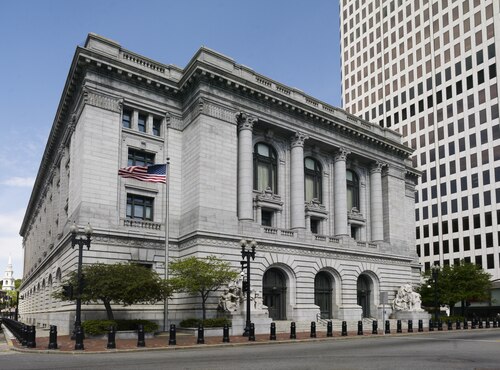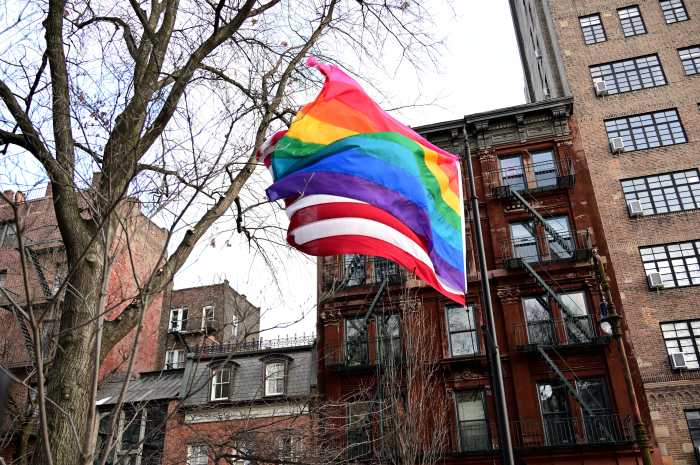On his first day in office, President Donald Trump signed Executive Order 14168, titled “Defending Women from Gender Ideology Extremism and Restoring Biological Truth to the Federal Government.” The order defined “gender ideology” as replacing “the biological category of sex with an ever-shifting concept of self-assessed gender identity, permitting the false claim that males can identify as and thus become women and vice versa and requiring all institutions of society to regard this false claim as true.” The order specified that the federal government’s policy is that there are two sexes, male and female, fixed upon conception and immutable.
In effect, the order means to deny the existence of transgender people as far as the federal government is concerned.
The order stated that “federal funds shall not be used to promote gender ideology. Each agency shall assess grant conditions and grantee preferences and ensure grant funds do not promote gender ideology.” The National Endowment for the Arts (NEA), a federal agency that makes grants to institutions and individuals in support of the arts, translated this order into action by adding to its program for grant approval a requirement that applicants certify that their work will not promote “gender ideology.” As broadly construed within the Trump administration, this would mean that anything addressing transgender issues would not be eligible for federal grant support.
Rhode Island Latino Arts, National Queer Theater, Theater Offensive, and Theatre Communications Group either have grant proposals for work that would be barred under the executive order and the NEA’s implementation policy or have member organizations whose projects would be similarly affected. They collectively filed suit in the US District Court in Rhode Island on March 6, seeking an injunction against the NEA and its acting chairperson, and a declaration that the policy is unconstitutional and in violation of the Administrative Procedure Act (APA), and soon filed a motion for a preliminary injunction to forestall the new policy while the litigation proceeds.
On April 3, Senior US District Judge William E. Smith, who was appointed by President George W. Bush, issued an opinion finding that plaintiffs would probably be able to prove that the gender ideology ban violates the First Amendment and that its adoption by NEA violates the APA. Smith declined to issue a preliminary injunction at that time because the NEA reacted to the filing of the lawsuit by starting a process to revise its policy. However, the revised policy still disadvantages grant proposals that relate to gender identity issues, and ultimately Judge Smith granted a preliminary injunction on Sept. 19, forbidding the agency from applying this new policy to grant proposals coming from the plaintiffs.
Judge Smith also found that the plaintiffs had shown that the NEA’s modified implementation policy violates the statute that governs the operation of the NEA, which forbids content-based censorship, and the APA, which can be invoked against agency policies and regulations that violate the constitution, the agency’s statutory mandate, or are otherwise arbitrary and capricious. The APA empowers the courts to “vacate” a policy on these grounds, and Judge Smith decided to take this step.
Apart from some quibbling about the language of the policy, the government’s main argument was that when federal funds pay for a project, it becomes “government speech” and is not subject to judicial review under the First Amendment, but Judge Smith decisively rejected this argument, pointing out that NEA grant recipients are not seen as speaking for the government to implement government policies. The grant is to enrich the cultural life of the United States by supporting the activities of creative institutions and artists.
“One safeguard against political interference is a prohibition against federal supervision or control over the policies, personnel, or operations of grant recipients,” wrote Judge Smith. The process of deciding on whether to approve a grant application is multilayered and includes an advisory panel, the National Council on the Arts, which is required to “recommend applications solely on the basis of artistic excellence and artistic merit.” The statute specifies a diversity and inclusion requirement for the membership of the advisory Council. Furthermore, the chair of the NEA “may not approve or disapprove any application until it is recommended for approval by the [National Council on the Arts].”
The process provides that the chairperson must ensure that “artistic excellence and artistic merit are the criteria by which applications are to be judged, taking into consideration general standards of decency and respect for the diverse beliefs and values of the American public.”
The Senate committee report on the statute said: “It is the intent of the committee that in the administration of this act there be given the fullest attention to freedom of artistic and humanistic expression,” and concludes, “Therefore, the committee affirms that the intent of this act should be the encouragement of free inquiry and expression. Conformity for its own sake is not to be encouraged, and no undue preference should be given to any particular style or school of thought or expression.”
So much for a new process under which “gender ideology” is to be totally ruled out or, as the Trump administration would interpret it, grant proposals may not “promote gender ideology” by exploring issues of gender identity.
In their attempt to avoid injunctive relief, the NEA officials had modified the process to authorize the chairperson to “independently assess those applications ‘for artistic excellence and merit, including whether the proposed project promotes gender ideology,” on a “case-by-case” basis. If the chairperson “concludes that a proposed project ‘promotes gender ideology’ it will not be ‘denied solely’ for that reason,” but it “could weigh against the project’s final approval.” In no circumstance, however, could it “weigh in favor of the project’s final approval.”
It is this modified version of the policy that Judge Smith blocked from being applied to the plaintiffs’ grant applications and that he vacated on Sept. 19, having concluded that this language in effect tips the scales against approving the applications that the Trump order would want not to be funded.
The court concluded “that the Final Notice [the modified statement of policy] restricts artists’ speech, and that it does so on the basis of viewpoint.” While providing no definition of what it means to “promote gender ideology,” the policy notes that “the EO requires executive agencies to take all necessary steps, as permitted by law, to ensure that agency funds are not used to promote gender ideology.” The court concluded that this means the NEA intends to “disfavor applications that promote gender ideology precisely because they promote gender ideology.” The First Amendment issue is clear to the court. This content-based treatment of applications is subject to “strict scrutiny.”
Because the government’s attorneys insisted that the First Amendment did not apply based on their rejected “government speech” theory, they did not attempt to articulate an argument that the policy is necessary to achieve a compelling government interest, or narrowly tailored to avoid unnecessary abridgement of free speech rights, so the court found that the government had effectively conceded that the policy fails judicial scrutiny and thus violates the First Amendment. And, under the APA, courts are to hold unlawful and “set aside” agency action that is in excess of statutory authority, arbitrary and capricious, or contrary to a constitutional right. There is no doubt that vacating the policy is authorized by the statute.
There can also be little doubt that the White House will demand an appeal of this ruling to the Supreme Court, perhaps without even waiting for the First Circuit Court of Appeals to consider it. (Since the First Circuit has five active judges, all appointed by Presidents Obama or Biden, one suspects that this Judge Smith’s ruling would be easily affirmed.) There is one vacancy on the circuit, and a Trump appointee has been approved by the Senate Judiciary committee, but the addition of one Trump appointee would not affect the outcome. There is a procedure for requesting the Supreme Court to consider an appeal directly from a district court opinion, which the Justice Department has resorted to in the past.
The plaintiffs are represented by attorneys from the American Civil Liberties Union and ny local counsel, Lynette Labinger of Providence, Rhode Island.





































